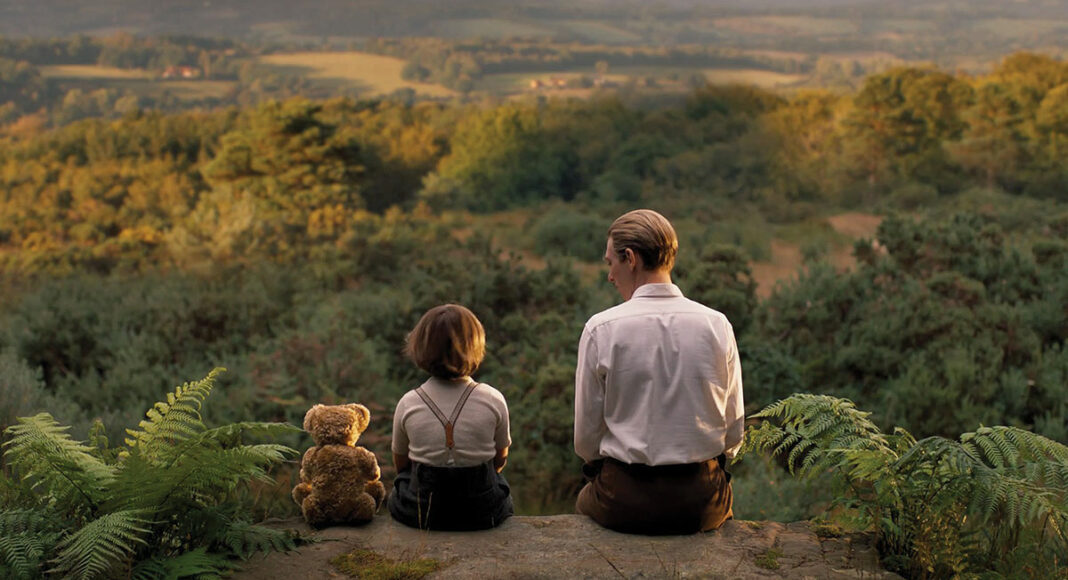A few weeks ago, I was ranting in these pages about biographical movies that commit a sin of admission—unable to be selective about the facts of a person’s real life, they let the point of the movie drown in too many details. Not so in Goodbye Christopher Robin. In telling a story about A. A. Milne, author of the celebrated Winnie the Pooh children’s books, director Simon Curtis seizes on one aspect of Milne’s life and career to focus on, and follows it through to its conclusion. A larger picture of Milne and his era emerges along the way, but it never distracts from the emotional core of Curtis’ very poignant film.
Curtis has impressive credentials for translating real-life stories to film, after directing My Week with Marilyn and Woman in Gold. Working from a thoughtful script by veteran Frank Cottrell Boyce and Simon Vaughan, Curtis crafts a gentle-spirited movie around a serious theme: how Milne’s harrowing experiences in World War I drove him to create the healing fantasy of Winnie the Pooh, inspired by his young son and his son’s toy animals. Serious, too, is the minor theme: the effect of worldwide fame on a 6-year-old boy.
After an ominous 1941 prologue, the movie switches back to the glitz and glamour of Jazz Age London. Alan Milne (Domhnall Gleeson) is a writer of frothy stage comedies who’s finding it hard to adjust to his old life after a tour of duty in the trenches of France. He keeps having devastating flashbacks of the battlefield—whenever a champagne cork pops, for instance, or a car backfires.
To “cheer him up,” his social-butterfly wife, Daphne (Margot Robbie) consents to bear their son, Christopher Robin. But after enduring childbirth, Daphne is eager to resume their usual round of parties and opening nights. Alan, however, who finds London too disturbing, shocks his wife by moving the family, along with Olive (the always endearing Kelly Macdonald), the young nanny who has raised the boy, to a country house in Sussex, where he hopes to start writing again.
Although he longs to produce a work that will convince people to abolish war, as they once abolished slavery, Alan is still unable to write in the country, and Daphne soon flees back to London. But when Alan is left alone for a few days with 5-year-old Christopher, whom everyone calls Billy (the disarmingly dimpled Will Tilston), wandering the benign, sunlit wood on their property, the two begin to bond. Alan starts to get drawn into the imaginative world Billy creates for his stuffed animals, which jump-starts Alan’s own creativity. Winnie the Pooh, Tigger, Eeyore, and Piglet are born.
These lovely scenes between Tilston and Gleeson (reserved at first, then playfully loosening up) are the heart of the movie. The publication and immediate global mania for the Pooh books and poems go by in a fleeting montage. (Director Curtis is smart enough to realize that’s the part of the story we already know.) But even as Billy becomes an accomplished, if reluctant celebrity (to Daphne’s delight), their father-son relationship is damaged. It’s heartbreaking that they can never again regain that golden time when the stories were just for the two of them, before the whole world was watching.
The movie has a brief, smart denouement as well, that never feels tacked-on, as Billy enters boarding school and suffers the consequences of being Christopher Robin. Alex Lawther is excellent as teenage Billy, trying to reconnect with his father after surviving his own personal hell—with the deeply ironic result that he seeks the anonymity of becoming a private in the army, just in time for the next World War.
It’s a little odd that, except for her hairstyle, Robbie’s Daphne doesn’t seem to age at all in the 20-some years the story covers. But otherwise, in these last few absorbing scenes, Curtis and his scriptwriters return to their main themes, which are paid off with very sharp attention to emotional detail and an enormously satisfying resolution.
GOODBYE CHRISTOPHER ROBIN
***(out of four)
Domhnall Gleeson, Margot Robbie, Kelly Macdonald, Will Tilston. Written by Frank Cottrell Boyce and Simon Vaughan. Directed by Simon Curtis. A Fox Searchlight release. Rated PG. 197 minutes.












